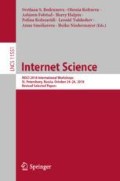Abstract
The increasing usage of chatbots is fundamentally changing the way people interact with new technology. Instead of clicking buttons to functionally navigate on a web page, people can access content and services by the use of natural language in interaction with an artificial agent (e.g., chatbot). This change toward human–chatbot interaction is typically manifested through a social and natural conversational style. This shift of how to interact with data and services has major repercussions for how to explore and measure conversational user experience with chatbots. Hence, in this paper we suggest the importance of measuring the social aspects in human–chatbot interaction through a focus on interpersonal communicational competence (ICC). We build our suggested framework on previous knowledge about communicational competence in successful human–human interaction. Based on this we have developed factors that might be of importance for chatbots’ ICC and how these can be measured.
Access this chapter
Tax calculation will be finalised at checkout
Purchases are for personal use only
References
Dale, R.: The return of the chatbots. Nat. Lang. Eng. 22(5), 811–817 (2016). https://doi.org/10.1017/S1351324916000243
Brandtzaeg, P.B., Følstad, A.: Chatbots: changing user needs and motivations. Interactions 25(5), 38–43 (2018)
Monk, A.: User-centred design. In: Sloane, A., van Rijn, F. (eds.) Home Informatics and Telematics. ITIFIP, vol. 45, pp. 181–190. Springer, Boston (2000). https://doi.org/10.1007/978-0-387-35511-5_14
Brandtzæg, P.B., Følstad, A., Heim, J.: Enjoyment: lessons from Karasek. In: Blythe, M.A., Overbeeke, K., Monk, A.F., Wright, P.C. (eds.) Funology. Human-Computer Interaction Series, vol. 3, pp. 331–341. Springer, Dordrecht (2018). https://doi.org/10.1007/1-4020-2967-5_6
Nass, C., Steuer, J., Tauber, E.R.: Computers are social actors. In: Proceedings of the SIGCHI Conference on Human Factors in Computing Systems, Boston, Massachusetts, USA, pp. 72–78 (1994). https://doi.org/10.1145/191666.191703
Bargas-Avila, J.A., Hornbæk, K.: Old wine in new bottles or novel challenges: a critical analysis of empirical studies of user experience. In: Proceedings of the SIGCHI Conference on Human Factors in Computing Systems, Vancouver, BC, Canada, pp. 2689–2698 (2011). https://doi.org/10.1145/1978942.1979336
Brooke, J.: SUS-A quick and dirty usability scale. In: Usability Evaluation in Industry, vol. 189, no. 194, pp. 4–7 (1996)
Ho, C.-C., MacDorman, K.F.: Revisiting the uncanny valley theory: developing and validating an alternative to the Godspeed indices. Comput. Hum. Behav. 26(6), 1508–1518 (2010). https://doi.org/10.1016/j.chb.2010.05.015
Biocca, F., Harms, C., Burgoon, J.K.: Toward a more robust theory and measure of social presence: review and suggested criteria. Presence: Teleoper. Virtual Environ. 12(5), 456–480 (2003). https://doi.org/10.1162/105474603322761270
Spitzberg, B.H., Hecht, M.L.: A component model of relational competence. Hum. Commun. Res. 10(4), 575–599 (1984). https://doi.org/10.1111/j.1468-2958.1984.tb00033.x
Rubin, R.B., Martin, M.M.: Development of a measure of interpersonal communication competence. Commun. Res. Rep. 11(1), 33–44 (1994). https://doi.org/10.1080/08824099409359938
Anders, S.L., Tucker, J.S.: Adult attachment style, interpersonal communication competence, and social support. Pers. Relat. 7(4), 379–389 (2000). https://doi.org/10.1111/j.1475-6811.2000.tb00023.x
De Graaf, M.M., Allouch, S.B.: Exploring influencing variables for the acceptance of social robots. Robot. Auton. Syst. 61(12), 1476–1486 (2013). https://doi.org/10.1016/j.robot.2013.07.007
De Graaf, M., Ben Allouch, S., Van Dijk, J.: Why do they refuse to use my robot?: Reasons for non-use derived from a long-term home study. In: Proceedings of the 2017 ACM/IEEE International Conference on Human-Robot Interaction, Vienna, Austria, pp. 224–233 (2017). https://doi.org/10.1145/2909824.3020236
Medhi Thies, I., Menon, N., Magapu, S., Subramony, M., O’Neill, J.: How do you want your chatbot? An exploratory Wizard-of-Oz study with young, urban indians. In: Bernhaupt, R., Dalvi, G., Joshi, A., Balkrishan, D.K., O’Neill, J., Winckler, M. (eds.) INTERACT 2017. LNCS, vol. 10513, pp. 441–459. Springer, Cham (2017). https://doi.org/10.1007/978-3-319-67744-6_28
Fitzpatrick, K.K., Darcy, A., Vierhile, M.: Delivering cognitive behavior therapy to young adults with symptoms of depression and anxiety using a fully automated conversational agent (Woebot): a randomized controlled trial. JMIR Mental Health 4(2), e19 (2017). https://doi.org/10.2196/mental.7785
Kim, J., et al.: Can a machine tend to teenagers’ emotional needs?: A study with conversational agents. In: Extended Abstracts of the 2018 CHI Conference on Human Factors in Computing Systems, Montreal QC, Canada, pp. LBW018 (2018). https://doi.org/10.1145/3170427.3188548
Marrinan, F.: Qualitative investigations into a virtual CBT therapist: relational features, client experiences and implications for counselling psychology practice. Doctoral thesis, University of Surrey (2018)
Luger, E., Sellen, A.: Like having a really bad PA: the gulf between user expectation and experience of conversational agents. In: Proceedings of the 2016 CHI Conference on Human Factors in Computing Systems, San Jose, California, USA, pp. 5286–5297 (2016). https://doi.org/10.1145/2858036.2858288
Curry, A.C., Rieser, V.: # MeToo Alexa: how conversational systems respond to sexual harassment. In: Proceedings of the Second ACL Workshop on Ethics in Natural Language Processing, New Orleans, Louisiana, pp. 7–14 (2018)
Di Gaetano, S., Diliberto, P.: Chatbots and conversational interfaces: three domains of use. In: Fifth International Workshop on Cultures of Participation in the Digital Age, Castiglione della Pescaia, Italy, vol. 2101, pp. 62–70 (2018)
Spitzberg, B.H.: Preliminary development of a model and measure of computer-mediated communication (CMC) competence. J. Comput.-Mediat. Commun. 11(2), 629–666 (2006). https://doi.org/10.1111/j.1083-6101.2006.00030.x
Author information
Authors and Affiliations
Corresponding author
Editor information
Editors and Affiliations
Rights and permissions
Copyright information
© 2019 Springer Nature Switzerland AG
About this paper
Cite this paper
Skjuve, M., Brandzaeg, P.B. (2019). Measuring User Experience in Chatbots: An Approach to Interpersonal Communication Competence. In: Bodrunova, S., et al. Internet Science. INSCI 2018. Lecture Notes in Computer Science(), vol 11551. Springer, Cham. https://doi.org/10.1007/978-3-030-17705-8_10
Download citation
DOI: https://doi.org/10.1007/978-3-030-17705-8_10
Published:
Publisher Name: Springer, Cham
Print ISBN: 978-3-030-17704-1
Online ISBN: 978-3-030-17705-8
eBook Packages: Computer ScienceComputer Science (R0)

